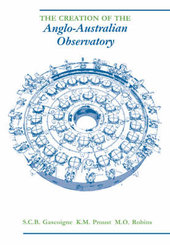
|
The Creation of the Anglo-Australian Observatory
Paperback / softback
Main Details
| Title |
The Creation of the Anglo-Australian Observatory
|
| Authors and Contributors |
By (author) S. C. B. Gascoigne
|
|
By (author) K. M. Proust
|
|
By (author) M. O. Robins
|
|
Foreword by Paul J. Wild
|
|
With Sir Robert Wison
|
| Physical Properties |
| Format:Paperback / softback | | Pages:316 | | Dimensions(mm): Height 244,Width 170 |
|
| Category/Genre | Observatories, equipment and methods |
|---|
| ISBN/Barcode |
9780521020190
|
| Classifications | Dewey:522.199444 |
|---|
| Audience | |
|---|
| Illustrations |
Worked examples or Exercises
|
|
Publishing Details |
| Publisher |
Cambridge University Press
|
| Imprint |
Cambridge University Press
|
| Publication Date |
29 September 2005 |
| Publication Country |
United Kingdom
|
Description
This book is the official history of the Anglo-Australian Telescope which started to be built at Coonabarabran in New South Wales 1968 and came into operation in 1974. The telescope is part of the Anglo-Australian Observatory which provides facilities for research in optical astronomy for scientists from Britain and Australia. The authors of this book were all involved in different capacities throughout the development of the telescope. As such it gives a detailed and personal record of the scientific, administrative and political developments from the moment negotiations began to the present day. The AAT has been, and continues to be, an outstanding success and can lay claim to being the best instrumented telescope in the world, with a very wide capability and high sensitivity. This is a unique and important book.
Reviews"...well-researched detail of debates about how the observatory would be run, how autonomous it would be, how observing time for locals and visitors would be allocated, where the instrumentation and maintenance groups would be located." Choice "... will be of interest to those who worked to create, and who have worked at the observatory. It will also doubtless provide policy makers and future historians with material and pointers..." Science
|